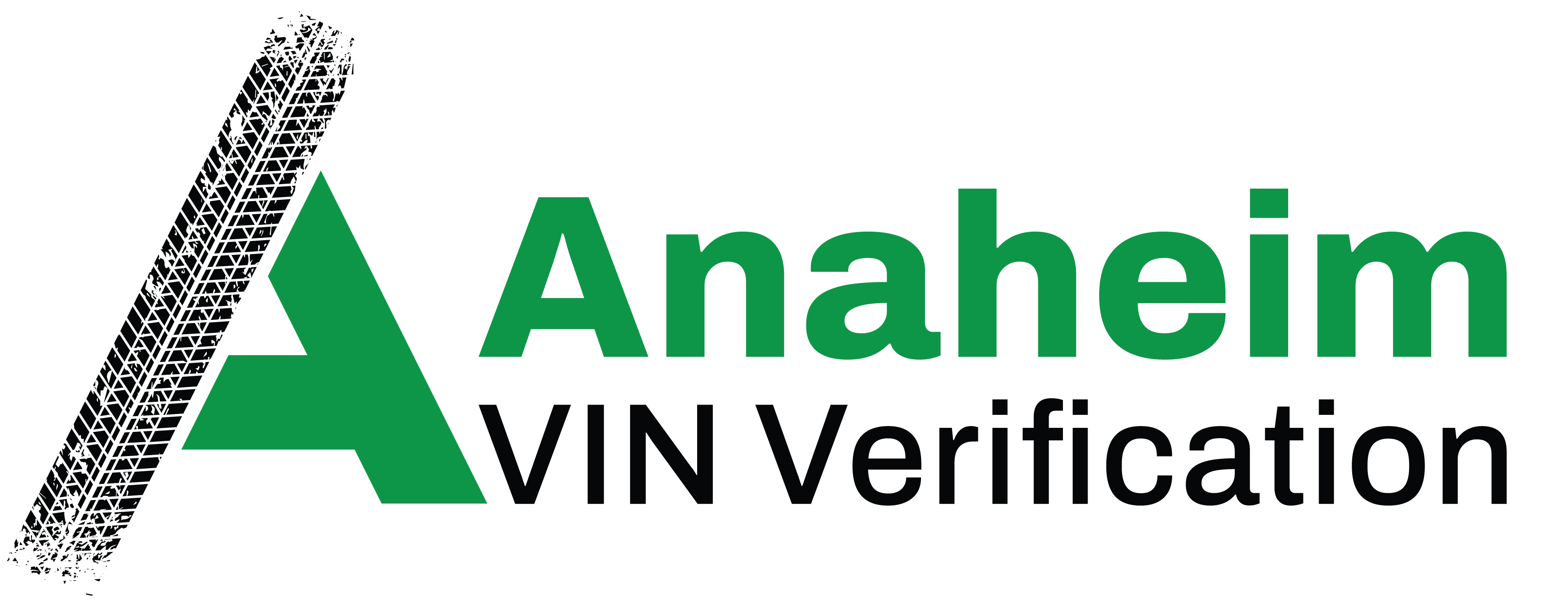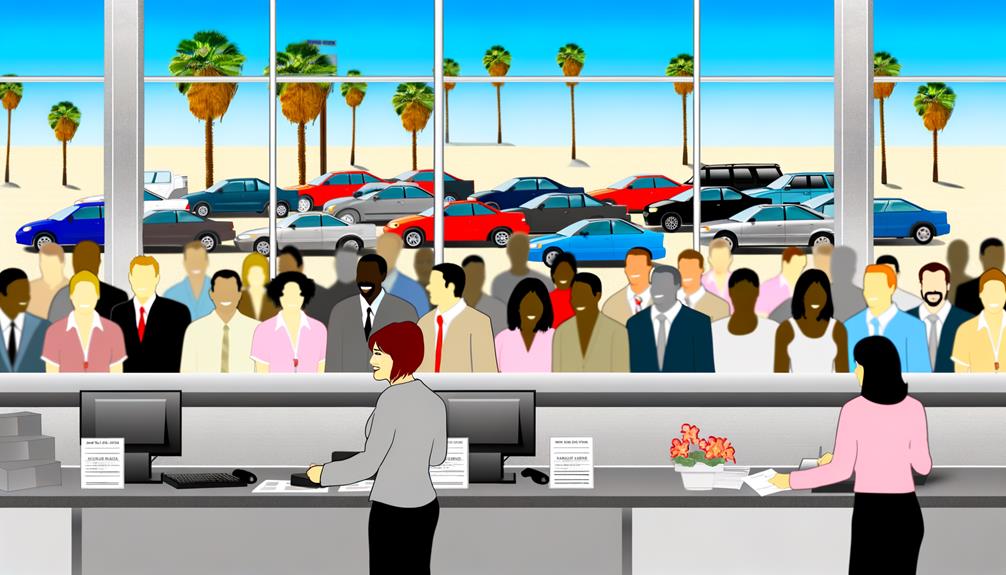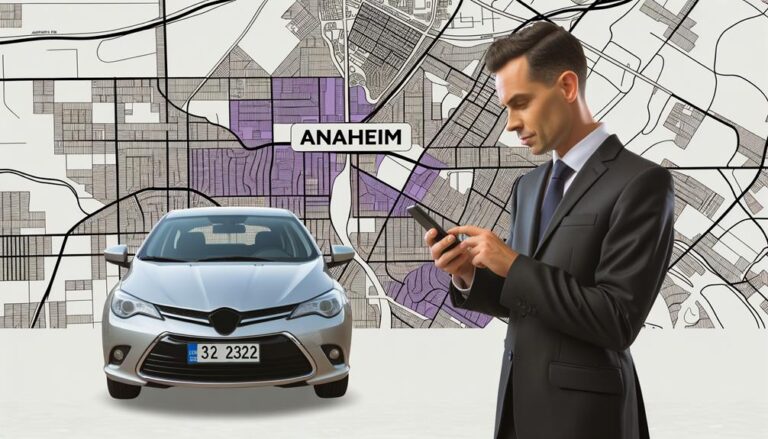New California Residents – How to Register Your Car in California
If you've just moved to California, you're likely aware that you've got 20 days to register your car—a task that requires navigating a few specific steps. You'll need to provide proof of insurance and a smog check, unless your car is exempt, and complete the Application for Title or Registration. But what documents exactly should you gather, and how do you determine if your vehicle needs a smog check? The process can seem daunting, and it's crucial not to miss any steps to avoid penalties. Let's discuss the essentials and some common pitfalls to watch out for during your registration journey.
Understanding Registration Requirements
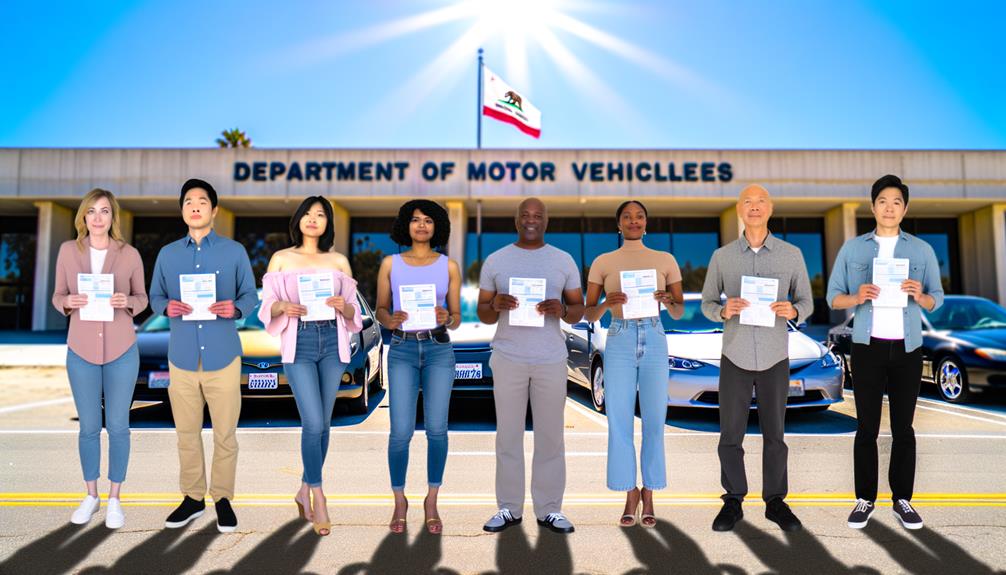
Are you settling down in California? If you've brought your car from another state, you'll need to tackle the registration process within 20 days of becoming a resident to comply with state laws. Navigating this process involves several key steps and specific documentation.
Firstly, proof of insurance is mandatory. Ensure your coverage meets the minimum requirements: $15,000 for injury or death per person and $5,000 for property damage. Without this, you can't proceed with the registration.
Next, check if your car needs a smog check. Most vehicles aren't exempt, so it's likely you'll need to get this done. The smog check certification is essential for completing your registration.
You'll also need to fill out an Application for Title or Registration (REG 343). Along with this form, make sure to have your out-of-state title ready to submit. These documents are crucial in proving ownership and eligibility for registration.
Additionally, if your vehicle is from outside California, a VIN verification will be necessary to ensure its legitimacy and compliance with state regulations.
Lastly, be prepared to pay the registration fees. These fees vary based on your vehicle type, its purchase price, and your location in California. The base registration fee starts at $74 but may increase depending on these factors.
Scheduling Your DMV Appointment
Booking your DMV appointment promptly is crucial when registering your car in California as a new resident.
To start, you'll need to schedule an appointment at your local DMV office. This can be done conveniently online or by phone. It's wise to do this as soon as possible, as availability can greatly vary depending on the time of year and your specific location.
Ensure you select a date that's within 20 days of your move to California. This timeframe is important to meet the state's registration requirements for new California residents.
Before you head to the DMV, make sure you have all the necessary documents ready. These include your proof of insurance, the out-of-state title of your vehicle, and a completed Application for Title or Registration (REG 343).
Additionally, some local DMV offices might offer vehicle inspections and smog checks during your appointment. It's a good idea to check this in advance so you can take care of these requirements in one go.
Preparing ahead and choosing the right appointment slot will streamline the process to register your out-of-state car efficiently in California.
Gathering Necessary Documents
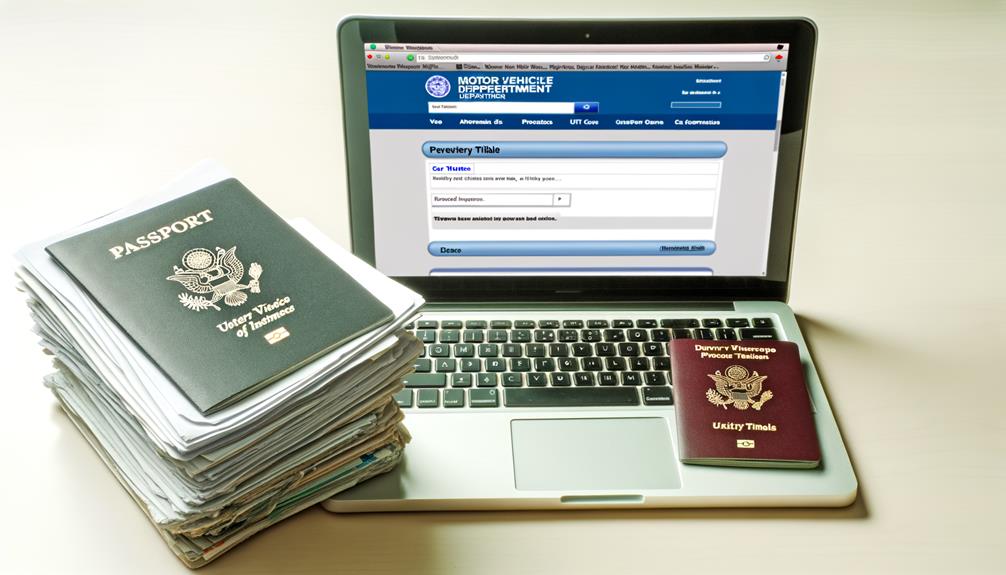
Gathering the necessary documents is your first step towards registering your car in California. As a new California resident, you'll need to compile a few crucial items to ensure your vehicle meets state requirements.
Start by securing the Application for Title or Registration (REG 343), which is essential for all new registrations. Alongside this, you'll need your out-of-state title to prove ownership of the vehicle.
Next, ensure you have a valid proof of insurance. California law requires that your insurance meets minimum liability coverage, so check that your current policy complies.
If your vehicle is from out of state, a smog certificate will likely be necessary unless your vehicle is exempt. This certificate should be obtained prior to submitting your registration application to demonstrate that your vehicle adheres to California's emission standards.
Also, gather the registration certificate from your previous state. This document, along with any additional paperwork like a bill of sale or lienholder information, will support your registration application.
Completing Required Forms
Once you've gathered all necessary documents, it's time to complete the required forms to register your car in California.
Start with the Application for Title or Registration (REG 343), ensuring every title owner signs it. This application is crucial for both title and registration processing.
If you're registering a trailer, switch to Form REG 4017, and for commercial vehicles, use Form REG 4008.
Remember, vehicle verification is documented with Form REG 31, which includes checking the VIN against supporting documents to ensure its accuracy.
In the REG 343, you'll need to include your vehicle's VIN, make, model, year, and odometer reading. These details are vital to ensure your registration is accurate.
Alongside the completed forms, make sure to provide proof of insurance and the last issued out-of-state title.
You'll also need the vehicle's registration certificate.
Addressing Smog Check Needs
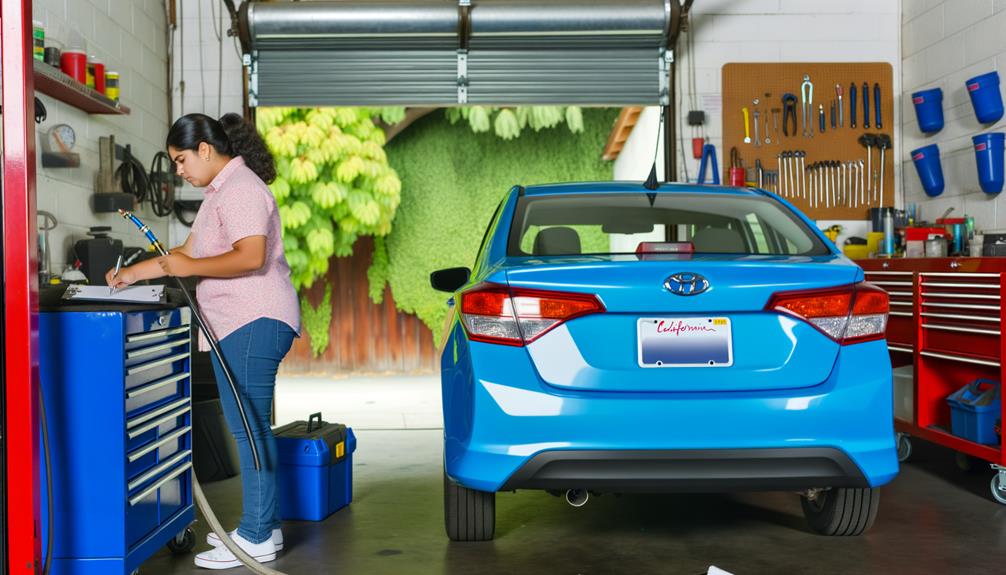
After completing the necessary forms, you'll need to address California's smog check requirements. As a new resident, you're likely wondering about the steps involved in registering a car, especially when it comes to emissions standards. The smog check is crucial for most California vehicles, ensuring they meet the required environmental standards.
Firstly, understand that the smog inspection must be completed before you can proceed with vehicle registration. Most vehicles, except for certain older models and electric vehicles, need to undergo this inspection.
If your car was manufactured in 1975 or earlier, or it's a diesel vehicle over 14,000 lbs from 1997 or earlier, you're exempt.
For new vehicles under four years old, a smog check isn't required; however, you'll pay a smog abatement fee of $20. This fee is part of the overall vehicle registration fee processed through the California DMV.
Remember, you'll need to submit the smog inspection certificate as part of your registration documentation. This certificate is proof that your vehicle adheres to emissions standards.
Keep in mind, smog checks are required biennially for most vehicles. Staying compliant ensures you avoid any hitches with the California DMV during your registration process.
Calculating Registration Fees
Calculating your registration fees in California involves several components, depending on your vehicle's type, model year, and the county where you reside. The base registration fee starts at $74, but don't forget about the additional fees that can add up quickly.
For instance, there's a $32 California Highway Patrol (CHP) fee and a $20 smog fee, which are mandatory. If you've opted for a zero-emission vehicle, add a $17 fee to your total.
To accurately calculate your total cost, use the California DMV's vehicle registration fee calculator. This handy tool considers all the necessary details, including your specific vehicle type and residence location, to give you a precise estimate.
Remember, the sales tax on your vehicle purchase also affects your registration fees. Depending on your county, the tax rate varies from 7.25% to 10%. So, if you're buying a $50,000 vehicle, you could be looking at anywhere from $3,625 to $5,000 just in sales tax.
Don't overlook the penalties for late registration. If you're past the 20-day grace period, a $30 penalty kicks in, escalating to $100 if you delay beyond two years. Make sure you're on top of these dates to avoid extra costs.
Visiting the DMV

When you're ready to register your vehicle, scheduling an appointment at your local DMV can significantly reduce your wait time and streamline the process.
Before you head to the DMV, ensure you've gathered all the required documents. You'll need your proof of insurance, the last issued out-of-state title, and a completed Application for Title or Registration (REG 343). Establishing your residency in California is crucial, so bring any additional proof required by the DMV.
It's also essential to complete a smog check and VIN verification before your appointment. These are mandatory to register your car in California and can be done at certified locations around the state. For a smoother process, consider using a directory to find certified VIN verifiers in your area. Having these inspections completed in advance will make your DMV visit much smoother.
At the DMV, you'll be required to surrender your out-of-state license plates. Be prepared to pay the registration fees, which vary depending on your vehicle and location. You might want to use the DMV's fee calculator beforehand for an accurate estimate.
Finalizing Registration Process
Once you've submitted your Application for Title or Registration (REG 343), proof of insurance, and the out-of-state title at the DMV, it's time to handle the fees.
The basic registration fees start at $46, but remember to budget for any late fees if your registration is delayed beyond 20 days.
Next, if your vehicle isn't exempt, you'll need to provide a smog certificate to prove it meets California's emissions standards.
After you've paid the fees and submitted your smog certificate, the DMV will process your application.
You're almost done with finalizing the registration process. Soon, you'll receive your California license plates and registration stickers.
Make sure to affix these to your vehicle promptly; the plates go on the front and back, while the sticker should be placed in the designated spot on the rear plate.
Lastly, it's crucial to keep a copy of submitted documents and all receipts.
These will serve as proof of your registration and are essential to have on hand during traffic stops or when you need to verify your vehicle's registration status.
Maintaining Compliance Post-Registration
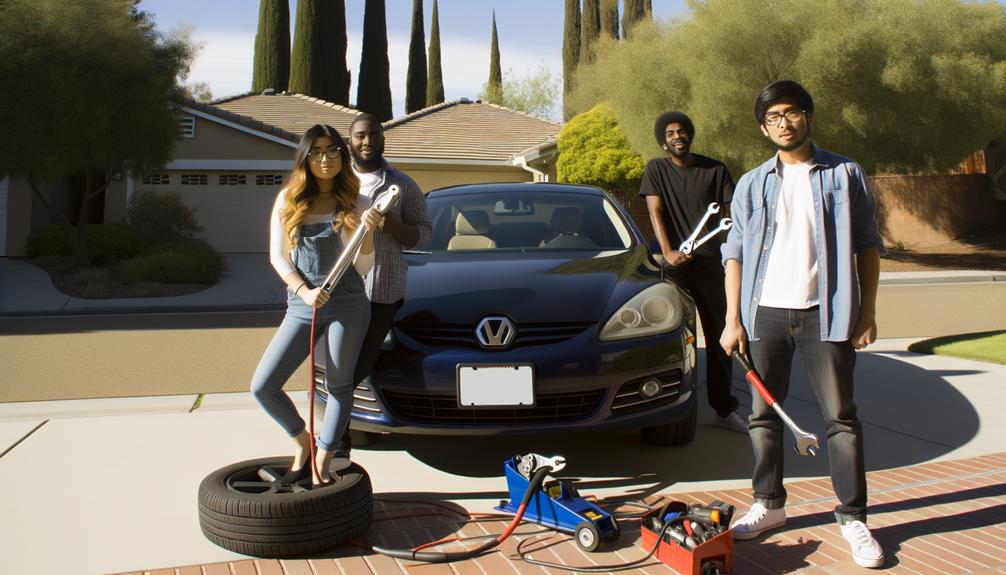
After you've successfully registered your car in California, it's essential to keep your registration current to avoid penalties.
Remember, the California DMV requires you to renew your registration annually. Set reminders because late renewals can lead to unnecessary fees and taxes.
Always keep your proof of insurance handy and updated. Driving without it isn't just risky; it's illegal and complicates both your compliance status and registration renewal process.
Furthermore, you'll need to ensure your vehicle passes a smog test every two years. This isn't just for keeping the air clean; it's a strict requirement to renew your registration.
Life changes, and so might your details. If you move houses or decide to sell your vehicle, you must notify the DMV.
For address changes, you have 10 days to update your information to stay compliant. Selling your car? You've got just 5 days to complete the transfer of title and inform the DMV.
This step is crucial to protect yourself from future liabilities and maintain compliance.
